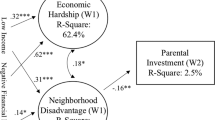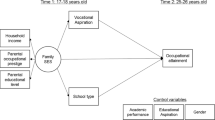Abstract
This paper is an empirical exploration of the effects of a variety of family and economic circumstances experienced during childhood on one indicator of success in young adulthood-high school completion. The estimates suggest that parental education and mother’s work are positive and significant determinants of high school completion, whereas growing up in a family with more children (who compete for resources), being persistently poor and on welfare, and moving one’s residence as a child have significant negative impacts on high school completion. The effects of some family stress and economic events differ depending on the age of the child when they occur. The results support the economic model of investment in children, as well as the welfare culture and socialization models.
Similar content being viewed by others
References
Altonji, J. 1988. “The Effects of Family Background, School Characteristics, High School Curriculum on Education, Labor Market Outcomes, and the Return to Education.” Teachers College, Columbia University. Photocopy.
Alwin, D. F. and A. Thornton. 1984. “Family Origins and the Schooling Process.” American Sociological Review 49:784–802.
Becker, G. S. 1981. A Treatise on the Family. Cambridge: Harvard University Press.
Becker, G. S. and N. Tomes, 1986. “Human Capital and the Rise and Fall of Families.” Journal of Labor Economics 4:SI-S39.
Behrman, J. R., Z. Hrubek, P. Taubman, and T. J. Wales, 1980. Socioeconomic Success: A Study of the Effects of Genetic Endowments, Family Environment, and Schooling. New York: North-Holland.
Behrman, J. R., R. A. Pollak, and P. Taubman, 1986. “Genetic and Environmental Determinants of Schooling Attainment Using Data on Relatives.” University of Pennsylvania. Unpublished document.
Behrman, J. R. and P. Taubman, 1985. “Intergenerational Earnings Mobility in the United States: Some Estimates and a Test of Becker’s Intergenerational Endowments Model.” Review of Economics and Statistics 67:144–51.
Corcoran, M. and L. Datcher, 1981. “Intergenerational Status Transmission and the Process of Individual Attainment.” In Five Thousand American Families-i-Patterns of Economic Progress, edited by M. S. Hill, D. H. Hill, and J. N. Morgan. Ann Arbor: University of Michigan Survey Research Center.
Corcoran, M., R. Gordon, D. Laron, and G. Solon, 1987. “Intergenerational Transmission of Education, Income, and Earnings.” Institute of Public Policy Studies, University of Michigan. Unpublished document.
Crane, J. 1988. “An Epidemic Model of Social Problems in Ghettoes.” John F. Kennedy School of Government, Harvard University. Unpublished document.
Danziger, S. and P. Gottschalk, 1986. “How Have Families with Children Been Faring?” Madison: Institute for Research on Poverty, University of Wisconsin.
Engle, P. 1980. The Intersecting Needs of Working Women and Their Young Children: A Report to the Ford Foundation. San Luis Obispo: California Polytechnic State University.
Featherman, D. L. and R. M. Hauser, 1978. Opportunity and Change. New York: Academic Press.
Hauser, R. M. and T. N. Daymont, 1977. “Schooling, Ability, and Earnings: Cross-Sectional Findings 8 to 14 Years after High School Graduation.” Sociology of Education 50:182–206.
Hauser, R. M. and D. L. Featherman, 1977. The Process of Stratification: Trends and Analysis. New York: Academic Press.
Haveman, R. and B. Wolfe, 1984. “Schooling and Economic Well-Being: The Role of Nonmarket Effects.” Journal of Human Resources 19:377–407.
Hetherington, E. M., K. A. Camara, and D. L. Featherman, 1983. “Achievement and Intellectual Functioning of Children in One-Parent Households.” In Achievement and Achievement Motives: Psychological and Sociological Approaches, edited by J. Spence. San Francisco: Freeman.
Hill, M. S. and G. Duncan, 1987. “Parental Family Income and the Socioeconomic Attainment of Children.” Social Science Research 16:39–73.
Hogan, D. and E. Kitagawa, 1985. “The Impact of Social Status, Family Structure, and Neighborhood on the Fertility of Black Adolescents.” American Journal of Sociology 90:825–55.
Jencks, C., S. Bartlett, M. Corcoran, J. Crouse, D. Eaglesfield, G. Jackson, K. McClelland, P. Meuser, M. Olneck, J. Schwartz, S. Ward, and J. Williams, 1979. Who Gets Ahead? The Determinants of Economic Success in America. New York: Basic Books.
Jencks, C., J. Crouse, and P. Meuser, 1983. “The Wisconsin Model of Status Attainment: A National Replication with Improved Measures of Ability and Aspirations.” Sociology of Education 56:3–19.
Jencks, C., M. Smith, H. Acland, M. Bane, D. Cohen, H. Gintis, B. Heyns, and S. Michelson, 1972. Inequality: A Reassessment of the Effect of Family and Schooling in America. New York: Basic Books.
Kiker, B. F. and C. M. Condon, 1981. “The Influence of Socioeconomic Background on the Earnings of Young Men.” Journal of Human Resources 16:94–105.
Krein, S. F. 1986. “Growing Up in a Single-Parent Family: The Effect on Education and Earnings of Young Men.” Family Relations, January, pp. 161–68.
Krein, S. F. and A. Beller, 1988. “Educational Attainment of Children from Single-Parent Families: Differences by Exposure, Gender, and Race.” Demography 25:221–34.
Levy, F. 1987. Dollars and Dreams: The Changing American Income Distribution. New York: Russell Sage Foundation.
Macaulay, J. 1977. “Stereotyping Child Welfare.” Society 13:47–51.
Marino, C. and R. McCowan, 1976. “The Effects of Parent Absence on Children.” Child Study Journal 6:165–82.
McLanahan, S. 1985. “Family Structure and the Reproduction of Poverty.” American Journal of Sociology 90:873–901.
Sewell, W. H. and R. M. Hauser, 1975. Education. Occupation, and Earnings: Achievement in the Early Career. New York: Academic Press.
Shaw, L. B. 1982. “High School Completion for Young Women.” Journal of Family Issues 3:147–63.
Stafford, F. P. 1986. “Women’s Work. Sibling Competition, and Children’s School Performance.” American Economic Review 77:972–80.
Tomes, N. 1981. “The Family, Inheritance, and the Intergenerational Transmission of Inequality.” Journal of Political Economy 89:928–58.
Woelfel, J. and A. O. Haller, 1971. “Significant Others, the Self-Reflexive Act and the Attitude Formation Process.” American Sociological Review 36:74–87.
Wolfe, B. and J. R. Behrman, 1984. “Who Is Schooled in Developing Countries? The Roles of Income, Parental Schooling, Sex, Residence, and Family Size.” Economics of Education Review 3:231–46.
Author information
Authors and Affiliations
Rights and permissions
About this article
Cite this article
Haveman, R., Wolfe, B. & Spaulding, J. Childhood events and circumstances influencing high school completion. Demography 28, 133–157 (1991). https://doi.org/10.2307/2061340
Issue Date:
DOI: https://doi.org/10.2307/2061340




